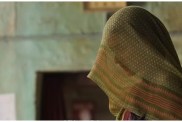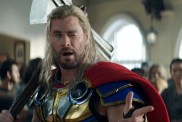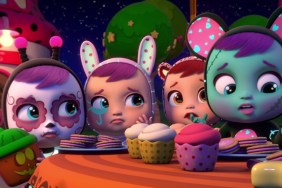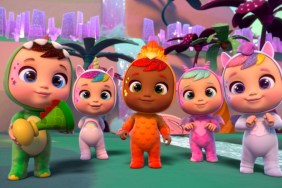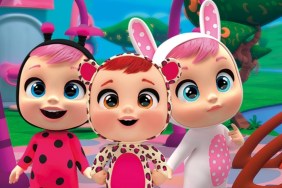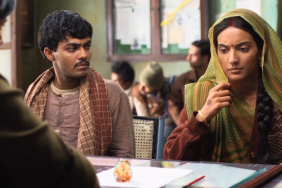
The April 19, 2013 release of The Lords of Salem commemorates Rob Zombie‘s first decade as a filmmaker in grand style. Never one to take the expected path, Zombie has followed up his gritty Halloween films with a stately slice of psychedelic evil. Lords of Salem is a morose meditation on addiction, self-destruction and the sins of the past manifesting in destruction of the present.
He is also well known for his music, beginning with his legendary band White Zombie (a reference to the classic Bela Lugosi vehicle from 1932) and moving on to phenomenal success as a solo artist where he cut his filmmaking teeth lensing his own videos. To coincide with his latest cinematic endeavor, he has a new album, [amazon asin=”B00B9I4Q9I” text=”Venomous Rat Regeneration Vendor”], which drops April 23.
He is without a doubt my favorite living director working in the genre and I’ve long sang his praises in writing (read that HERE) and ardently defended his work on podcast guest spots (Listen to one HERE). So it goes without saying, to have been able to conduct this interview was a true honor, made all the better for how open, intelligent and accommodating Zombie turned out to be.
On the eve of his fifth theatrically released motion picture hitting screens, I thought it would be illuminating to discuss his ten years behind the camera. I’ll go through them in chronological order this week, beginning today with his 2003 debut…
House of 1000 Corpses
Released in April of 2003, House of 1000 Corpses kick started the horror renaissance of the post 9/11 era. Hitting theaters roughly three weeks after we invaded Iraq and toppled Saddam Hussein’s Ba’athist regime, House of 1000 Corpses was both emblematic and predictive of the genre during this time even though it was shot three years prior to its release.

In many ways the ultimate horror film, Corpses integrates stylistic flourishes from a centuries worth of genre evolution. Eagle eyed viewers will detect notes of German expressionism, classic Universal Monsters, 50’s creature features, gritty 70’s exploitation, 80’s rubber reality and millennial meta self-awareness effortlessly commingling and coalescing into a veritable symphony of horror.
The story, two young couples take a misguided tour onto the back roads of America in search of a local legend known as Dr. Satan. Lost and stranded, they are set upon by a bizarre family of psychotics. Murder, cannibalism and satanic rituals are just a few of the horrors that await.
This is where my interview with Zombie began…
How did a background directing your music videos influence the manner you associated sound with image and built the narrative rhythmically?
Rob Zombie (RZ): It influenced it greatly because up to that point it had been the only true experience I had. I mean, obviously as a kid, I made goofy Super 8 movies, but they were nothing. I was still thinking rhythmically in pictures and music and images and wasn’t quite as concerned with the narrative and things like that. Once the movie was done and I looked at it, I realized that. So I really tried to change things with the next film.
The first movie [House of 1000 Corpses], people really seem to like it now though I know they didn’t like it at the time. It’s definitely a movie I could never make again. It’s a movie made by someone who doesn’t know the rules of anything!
When assembling the film, how much of the montage and pastiche sections were conscious choices and how much would you consider “lucky accidents” that came about in the editing process? How involved with the editing process were you?
Rob Zombie (RZ): I was as involved in the editing process as anybody. I think sometimes people think you make a movie and hand it to an editor and he cuts it. That’s not how it works. Myself anyway, every second the editor is in front of the film, so am I. Side by side, elbow to elbow, day after day after month after month (laughs). Every single frame of the movie is there because that’s the frame I wanted there. I don’t mean that in a crazy way, I think that’s true of every director on planet Earth. Most of the choices were made due to being the only choices I could make to make sense of what I had done.
One thing you learn on your first film, at least I did, is what you’re going to need in the editing room. Unfortunately, you learn that when you get there so it’s already too late. I didn’t cover that scene enough, I covered this scene too much, that didn’t work or this is wrong, these are the things that even on a big budget movie, it still happens. That’s why they go back and reshoot for 6 months sometimes, because they didn’t get it the first time.
On smaller movies, you don’t ever have that luxury, you just have to say, “Okay, let’s hope they made all the right choices the first time out of the gate”. That new G.I. Joe movie they went back and shot forever. Sometimes it happens. Why? I don’t know, but lower budget films you don’t have the luxury, so any choice you made is to make the film work.
Some found the drastic changes in style and tone to be jarring. I found it exhilarating. Did you specifically want to bring so many disparate elements and time periods of genre film making into play on your first feature?
RZ: I never thought of it that way. Like any fan of anything, all this stuff has been going into your head non-stop for years and years since you were little. So when you make your first film, it’s like all the influences you’ve had over your lifetime come exploding out of every frame. I don’t think it was a conscious effort where I wanted this to be like this or that to be like that. I wasn’t thinking about it on that level, there was just no other way to do it. You look at huge, influential bands and go back to their early work, they’ll sound a lot like whoever they emulated at the time. That’s sort of the way you begin any career. It just happens because you’ve got to start someplace and either consciously or unconsciously start with the things that appeal to you. Then you work it out of your system and develop your own style.
The thing with Corpses is that horror movies had disappeared from the landscape at that time. Major studios weren’t making them, they weren’t really around that much. You just didn’t see crazy movies with really fucked up characters in the lead. Those were the characters I always loved, be it Frankenstein or Leatherface. I wanted to make a movie with the crazy, bad characters in the forefront as opposed to the beautiful victims.
I remember
Eli Roth came up to me and saidif it wasn’t for Corpses,
Cabin Feverwouldn’t have happened
That was definitely the problem with that era and why I had been out of the genre since the mid-’90s. Your film reinvigorated my love for the genre and kicked off the horror boom of the 2000s.
RZ: People have told me that. I feel sometimes the first one out of the gate is the sacrificial goat. I remember Eli Roth came up to me and said if it wasn’t for Corpses, Cabin Fever wouldn’t have happened. If that can be the by-product, then it’s great if you can help someone else along.
Not only divisive among horror fans, Corpses was extremely off-putting to a general audience that wandered in expecting a light-hearted spookshow. Every one of the five times I saw the film theatrically during its initial run was riddled with walkouts and people shouting at the screen angrily.
The film spoke to my sensibilities and aesthetic preoccupations so strongly, it seemed made specifically for me. I was especially ecstatic with its arrival after the drought of the ’90s and the spate of toothless teen slashers that lazily paddled in Scream‘s wake. Watching the film make others so uncomfortable as to bellow at the screen or walk out in a pointed huff filled me with a perverse glee and the realization that I was witnessing something special for it to have provoked such a visceral response.
Every time I saw the film, there were walkouts. Usually after the protracted crane shot of Walton Goggins’ execution. I vividly remember someone uncomfortably shouting “just shoot him already!” I thought it was brilliant in how you forced the paying public to understand they were witnessing a cold blooded murder. Of an authority figure no less! Was it a deliberate ploy to antagonize the audience in this fashion?
RZ: That’s been a consistent theme for me to make you feel bad about the violence as opposed to enjoying it. That’s been something I’ve always felt is important.
It also brings to mind Otis’ declaration about forcing people to stop and look at the exposed belly of the beast. Do you feel a kinship with Otis as a character for his deeply held beliefs surrounding the purity of his artistic intentions?
RZ: I feel a kinship with every character in a weird or demented way. Every character is expressing what I feel, sometimes visually, sometimes with their dialogue. I mean, you have to figure the movie is coming from my brain, so that’s the way I’m thinking (laughs).
Sort of how they say every person in your dreams is an extension of you.
RZ: How could they not be?
Precisely!
Tomorrow, we’ll see how Zombie managed to continue the adventures of House of 1000 Corpses‘ Firefly clan without being tied down to the expectations placed on a sequel. Up next, The Devil’s Rejects!
MORE!
- PART ONE: House of 1000 Corpses
- PART TWO: The Devil’s Rejects
- PART THREE: Halloween
- PART FOUR: Halloween II
- PART FIVE: The Lords of Salem

